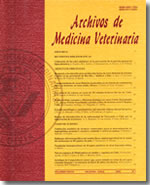Environmental factors affecting some reproductive traits of sows in the tropics of Mexico
Main Article Content
Abstract
The aim of this study was to determine the effect of some environmental factors on weaning to first service interval (WSI), weaning to conception interval (WCI), farrowing to first service interval (FSI), and farrowing interval (FI) and estimate their repeatabilities under the humid tropic conditions of Mexico. More than 33.000 observations from approximately 8.500 sows were used. The statistical model for those traits included the fixed effects of farm (1, 2, 3, 4), farrowing year (2007-2012), farrowing season (dry, rainy and windy), parity number (1, 2,...,> 8), and significant simple interactions, plus the random effects of sow and the error term. Covariates used were lactation length (LL) and litter size. The means for WSI, WCI, FSI and FI were 6.84 days, 9.80 days, 29.1 days, and 146 days, respectively. All main factors and the year by season interaction had significant effects (P < 0,05) on all response variables, except season for WSI and FSI. Lactation length had a quadratic effect on all variables. The repeatability estimates for WSI, WCI, FSI and FI were 0.067, 0.055, 0.067, and 0.050, respectively. In conclusion, management and feeding programs should consider parity number and duration of lactation in order to improve the reproductive performance of sows. The repeatabilities found for the studied traits were low.

